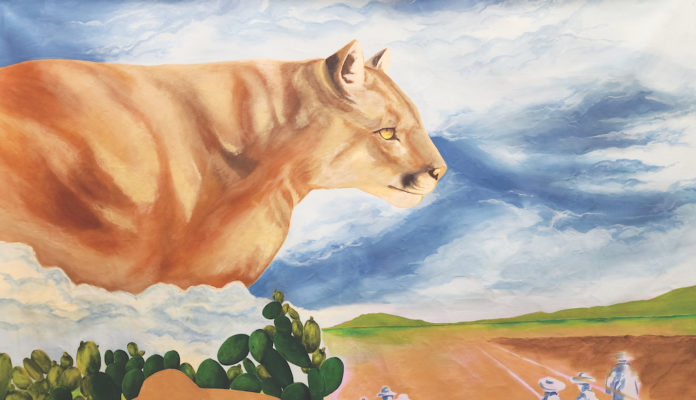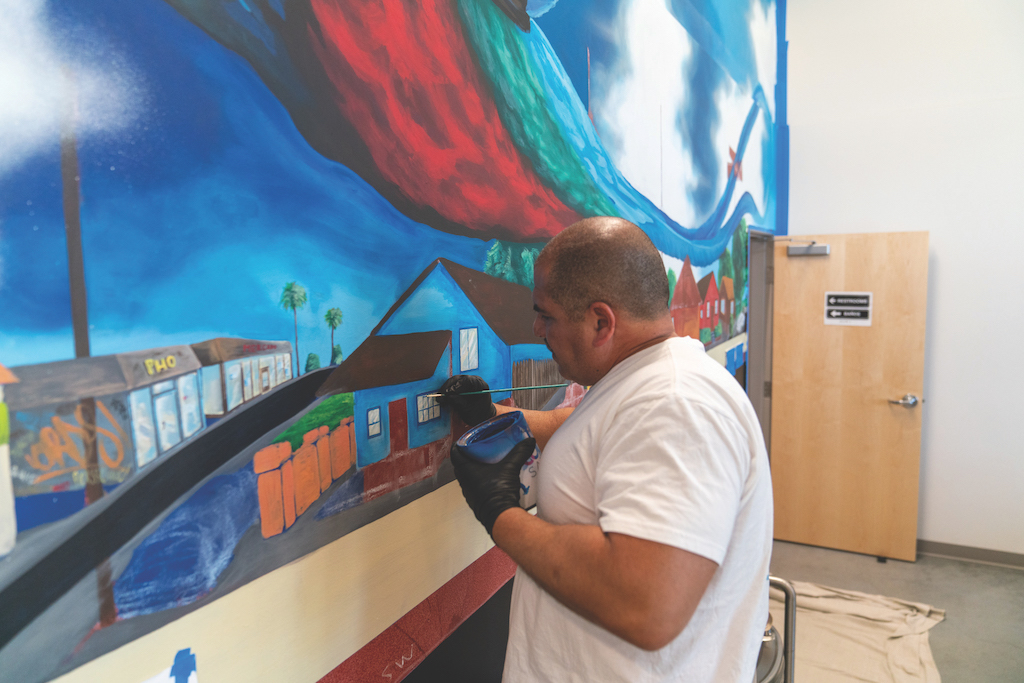
When San Jose-based artist Tomas Wisper Talamantes learned that New Museum (NUMU) wanted him to paint a mural about Los Gatos inside the museum, he had a lot of questions. The first one was where, exactly, this museum was.
“It’s not small, but it’s hidden,” Talamantes says. “And they have a lot of space! It looks small from the outside, but when you get inside, it’s huge.”
The self-taught artist is part of an organization called Local Color, which connects creatives in Santa Clara County with folks seeking artwork. When NUMU got in touch looking for someone who could create a history-inspired mural on location and share their process, Wisper was the obvious match.
“They wanted people to come and interact,” Talamantes says. Specifically, the museum had in mind several live sessions where visitors could watch the artist at work and ask him questions. While this kind of exposure can be difficult for some artists to balance as they work their magic, Talamantes is more than comfortable engaging with the community as he paints. In fact, he sees a social and educational process as a critical part of getting to the final product.
Talamantes’ artistic practice has been rooted in friendship, family and broader community since the beginning. Born in 1970 in San Jose to a Mexican-American family, he began drawing at age 10. “I was influenced by my mother,” he says.
“She was a very creative self-taught artist as well,” he says. “She used to paint rocks before Pet Rock was even a thing!” She loved to paint animals and her kids’ names on rocks so big they could be hard to lift.
An additional influence on Talamantes was the universe of Marvel Comics, whose heroes and villains captured his imagination and made him think about the ways important values could be embodied as characters and represented visually.
As he reached his teens, Talamantes found inspiration in street art and graffiti, which he saw as a thrilling way to get out into the world. “It was being part of something bigger than yourself, you know, belonging to this whole community,” he says. “[Graffiti] was a movement of mainly just youth. It wasn’t just you.”

Talamantes considers his first mural to be one he made with his friend Snow in the middle of the night in 1984. He clarifies, with a shy smile, “It was illegal.” They wrote their names in bold color on the wall of a four-square court near Branham High School.
“It let people know that you existed,” he says of his early graffiti days. “I think that’s with all art— people create art mainly to express themselves and say to the world I’m here. I exist. This is my contribution to society.”
A period of incarceration between 1990 and 2013 deepened the artist’s belief in the affirming power of art. It also had an impact on his style. “The illustrations that are done behind the walls in prison, they’re collages,” he says. “It’s multiple pictures altogether. […] There’s really no empty space.”
The condensed aesthetic of prison art—not to mention the low-quality tools—prepared Talamantes to continue working in unconventional styles and settings once released. In 2017, he took a big step when he reunited a group of friends he used to do graffiti with to found Together We Create. Today, the collective does live painting on location throughout the county.
When Talamantes was tasked with creating a history of Los Gatos, his first step was to research in NUMU’s local history collection, where he began to collage images of the Oholone people, the haciendas of the 19th century and contemporary urban life.
“I slowly started seeing what would fit together and how it could flow. I would cut and paste in my mind,” he says.
The mural now exists on separate panels that stretch around an entire room at NUMU. After some final touches, it will be installed in the museum’s south facing windows, visible from the outside.
A highlight for viewers is the enormous cougar that looks out over the entire story. The striking image is inspired by the name Mexican ranchers used for the area, La Rinconada de Los Gatos (The Cats’ Corner). Talamantes has enjoyed telling visitors about a past in which the cries of mountain lions could be heard across the valley.
Just as he once wrote his name on walls to assert his existence, Talamantes is now doing the same for past inhabitants of the land.
“This was their territory,” he says.









